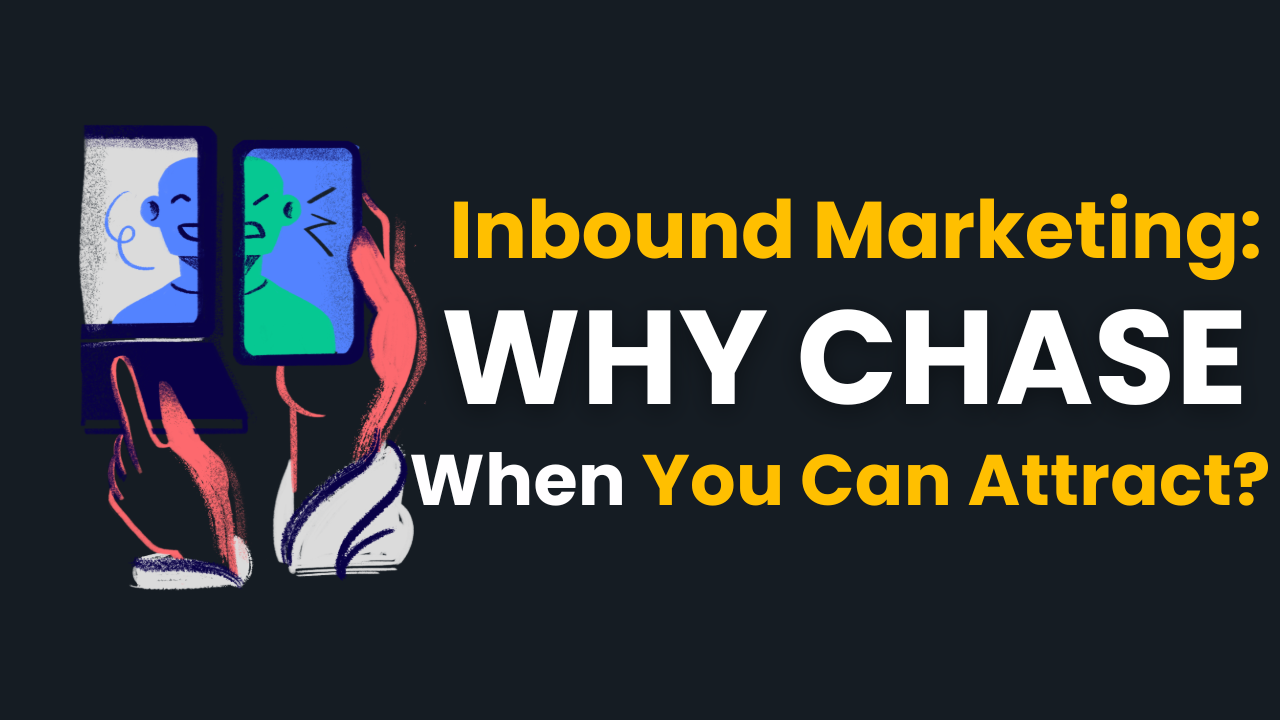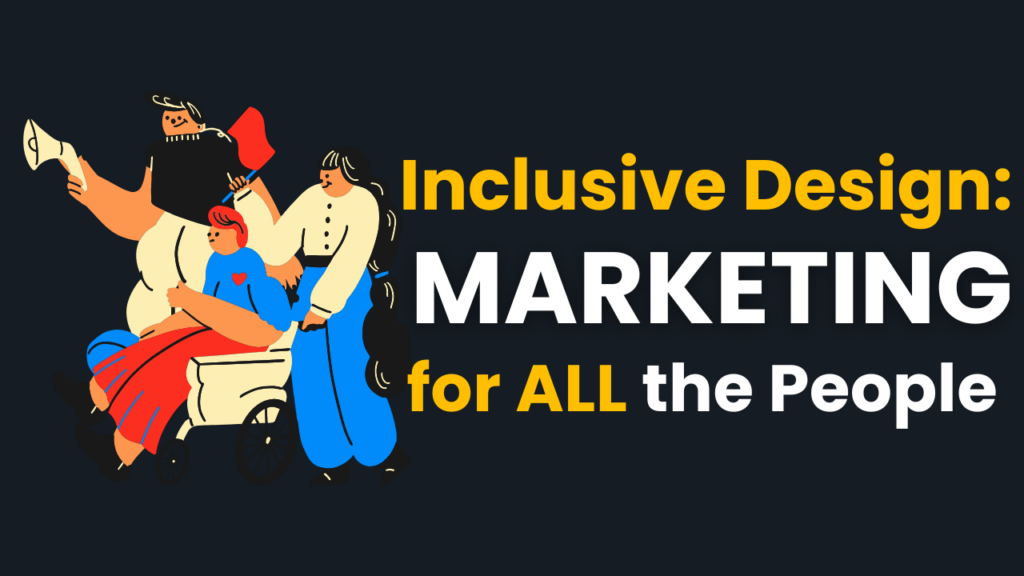
| Getting your Trinity Audio player ready... |
If you are a business owner, marketer, or only starting this path – you already must know that engaging, retaining, and converting customers into buyers nowadays isn’t a simple task.
Today’s competitive digital world is constantly forcing us to seek new ways to attract new customers.
But what is an effective channel to do so if people learn to cut off all the unnecessary white noise? The answer lies in inbound marketing.
What is actual inbound marketing?
It is a strategy of attracting relevant audiences to your products or services by creating customer loyalty. This smooth approach shows your authority to the relevant audience. Outbound marketing, on the other hand, does it in a more straightforward way. We’ll explain the difference later, but now let’s get into details.
What Is Inbound Marketing?
Inbound marketing means putting the customer first. Instead of interrupting your potential clients with traditional advertising (think pop-up ads, cold calls, and email blasts), it focuses on creating meaningful content that naturally draws people toward your brand. This is a customer-centric method that aims to build long-term relationships by addressing customer needs and providing solutions that resonate with them.
But what is an inbound marketing strategy, exactly? It typically includes content creation, starting with blogs, social media posts, videos, SEO, and lead nurturing through email marketing. By creating high-quality, relevant content, businesses attract visitors, convert them into leads, and ultimately turn them into loyal customers.
The strategies help businesses connect with their audience on a deeper level, ultimately leading to more conversions and long-term success.
Ready for the best part? This strategy works for B2B, B2C, small businesses, and even large corporations. If it still sounds overwhelming, you’ll need the help of a technical SEO agency.
Inbound Marketing Advantages and Examples
We’ll bet at least once in your life you’ve heard or seen these giants. But do you doubt that the effectiveness of inbound marketing can be seen across various industries?
Let’s dispel this myth, for instance:
- HubSpot, the software giant, uses a robust content marketing strategy to drive traffic to its website. We’re sure you were bumping up on their articles when looking for useful content. They provide free resources such as blogs, eBooks, and webinars to educate and engage the audience.
- Ahrefs, is a leader in SEO tools and education. Our team uses this tool religiously, and the way they use types of inbound marketing to attract customers is an example of success. Through their extensive library of guides, blogs, and tutorials, they naturally pull in users looking for expert SEO advice and actionable strategies. The time flies when you are reading their articles, which shows us a significant amount of effort they invested in content creation.
- Shopify is one more “whale” that uses every person, from kids to older people. Who’s not listening to music or podcasts? This e-commerce platform uses blog posts and video tutorials to help small business owners set up and scale their stores. So this is one more smart example.
These examples highlight how inbound marketing tactics like educational content, SEO, and customer engagement can drive growth. You might wonder how it can benefit your business in particular.
Why Is Inbound Marketing Important? Benefits for Your Business
It isn’t just a trend that comes along and goes—it’s a powerful method for driving sustainable growth. Here are some key benefits of inbound marketing that can transform your business:
1. Generates High-Quality Leads
First and foremost, it’s everything we’re here for: leads and revenue. Rather than casting a wide net, you focus on attracting the right audience. Its strategies are highly targeted, so the leads you generate are genuinely interested in your products or services, resulting in higher conversion rates.
2. Builds Trust and Credibility
To generate high-quality leads, you need to build trust around your brand. The right way to do it is by providing valuable, insightful content that solves your audience’s problems.
You establish yourself as a thought leader in your industry. Over time, this builds trust and credibility, which are critical in turning leads into loyal customers.
3. Cost-Effective
For businesses in the healthcare, travel, moving, or IT industries, traditional marketing tactics like TV ads, radio spots, and billboards can be expensive and often fail to provide a measurable ROI. Inbound marketing, on the other hand, leverages content marketing and SEO, which are far more cost-effective. Plus, the benefits compound over time, as your content continues attracting visitors long after it’s published.
4. Improves Customer Engagement
It doesn’t stop at lead generation; it helps maintain a relationship with your customers throughout their journey. Through personalized emails, follow-ups, and ongoing valuable content, you keep your audience engaged and loyal. In the world of tons of spam emails, it’s important to create personalized content so your customers feel validated.
5. Supports Long-Term Growth
Its focus on creating evergreen content means that the benefits continue to build over time. Each new piece of content adds to your business’s online presence, driving consistent traffic and generating leads long after it’s been published.
How Does Inbound Marketing Work?
It does not end at the stage of attracting customers. In the perfect scenario, your customers would go through these stages: Attract, Convert, Close, and Delight. But let’s take a closer look at each phase:
- the attract phase, this is where your content marketing and SEO efforts create a symbiosis. The goal is to attract potential customers by providing valuable content, such as blog posts, infographics, and social media posts that solve their problems.
- the convert phase is serving to convert your customers into leads, by encouraging them to take action. Because once you’ve attracted visitors, the next step is to convert them. This might be downloading a free eBook, signing up for a newsletter, or filling out a contact form.
- the closing phase comes after conversion, and the focus shifts to turning those leads into customers. Email marketing, lead nurturing, and personalized offers can help close the deal. Especially the last ones.
- last, but not least, would be the delight phase: inbound marketing doesn’t end once a sale is made. You continue to delight your customers through exceptional service, tailored content, and engagement, encouraging them to become advocates for your brand. You continue nurturing them, sending special offers, and always being in touch, making sure they aren’t forgotten and always very welcome.
Inbound Marketing Vs. Outbound Marketing
There’s a lot of confusion between these terms, isn’t it? So let’s break down the differences.
While inbound marketing is all about attracting customers through valuable content, outbound marketing is more traditional and interruptive. Outbound marketing includes tactics like cold calls, direct mail, and TV ads, where the goal is to push products directly to the audience.
Inbound marketing is often seen as more effective in the digital age because it’s less intrusive and more aligned with how consumers now make purchasing decisions. Outbound marketing still has its place, but it’s generally less cost-effective and provides less engagement than inbound marketing tactics.
Inbound marketing, like rock-n-roll – never dies:) Unless outbound can be very optional. Choose the one that aligns better with your goals, or try both ways simultaneously.
We are connoisseurs of rock-n-roll, so we’re about to reveal the best inbound marketing strategies for you.
Best Inbound Marketing Strategies
There are countless ways to approach it, but here are some of the most effective inbound marketing strategies:
1. Search Engine Optimization
Optimizing your website for search engines and making sure that your content is easily found by people searching for information relevant to your business. SEO consulting services can help businesses refine their approach to content and increase their visibility.
And if you are wondering how to get started with this one, Netrocket has you covered:)
2. Content Marketing
Content marketing is at the heart of any inbound marketing strategy. High-quality, valuable content attracts visitors to your site, provides them with solutions, and helps convert them into customers.
3. Social Media Marketing
Social media platforms allow you to share your content, engage with your audience, and build a community around your brand. By posting regularly and interacting with your followers, you can build strong connections that encourage customer loyalty.
4. Video Marketing
Video content is becoming increasingly popular, and it’s a powerful way to convey your message. In the era of Tiktok, everything’s converting into videos. And it’s a great way to include this in your marketing plan and show your customers that you are going Hand-in-hand with the market and trends. From how-to videos to behind-the-scenes content, video marketing can significantly boost engagement. And that’s what we started to implement in Netrocket’s strategy as well, with the hope for the best outcome:)
5. Email Marketing
Email marketing remains one of the most effective inbound marketing techniques. You definitely need to try this one. Personalized email campaigns can nurture leads and turn them into paying customers. However, the best part is that this strategy can be useful in different industries. Whether you work in healthcare, travel, music, or even the manufacturing industry, email marketing will help you to stay closer to your customers and promote your business.
New Inbound Marketing Trends in 2024
As we move into 2024, new inbound marketing trends are emerging that businesses need to be aware of:
- AI-Powered Personalization: AI technology allows businesses to offer hyper-personalized content and experiences to their audience. But!
Use it carefully because search engines are putting a strict measures on 100% - AI-generated content: With the correct use, it can save you a lot of time and give you useful insights.
- Voice Search Optimization: With the rise of voice-activated assistants, optimizing your content for voice search will become crucial. It’s not only progressive but also shows that your company cares about the importance of inclusivity. You can read more about such tools in our recent article.
- Interactive Content: Quizzes, polls, and interactive videos are gaining traction as they engage users in a more immersive way. Have you ever tried this one?
- Sustainability Marketing: As consumers become more environmentally conscious, businesses that prioritize sustainability in their messaging will resonate more with their audience.
In Summary
So, in this article, we uncovered why inbound marketing is a powerful and cost-effective approach to attracting, engaging, and retaining customers.
Remember that by putting the customer first and providing them with valuable content, businesses can build trust, generate high-quality leads, and foster long-term growth.
With evolving trends like AI personalization and voice search optimization, inbound marketing continues to adapt, making it a must for any business looking to succeed in today’s digital landscape. Work smart, not hard:)
FAQs
What Is the Definition of Inbound Marketing?
Inbound marketing is a customer-first strategy that focuses on attracting potential customers through valuable, insightful content and personalized experiences. Unlike traditional methods that push products through disruptive advertising, inbound marketing works by providing content that addresses the needs of your target audience, drawing them in naturally. For businesses looking to succeed in the digital age, leveraging home services marketing can be a game-changer. This approach builds long-term relationships, fostering trust and loyalty with your customers over time.
Why Does Inbound Marketing Work?
Inbound marketing is powerful because it meets consumers where they are, aligning with their modern purchasing behavior. People are tired of being bombarded by ads and sales pitches—they want solutions, insights, and genuine engagement. Inbound marketing works by offering exactly that, building trust and credibility with your audience through content that adds value to their lives. When coupled with professional guidance from b2b SEO experts or an organic SEO expert, your business can further refine its approach, ensuring that your message reaches the right people at the right time, increasing both engagement and conversions.
How Do You Implement Inbound Marketing?
To implement inbound marketing effectively, start by creating valuable content that resonates with your audience—content that answers their questions and solves their problems. Then, optimize that content for search engines with the help of a trusted SEO consulting company to ensure it’s easily discoverable. Consistently engage with your audience on social media, nurture your leads through personalized email campaigns, and consider complementing your efforts with PPC management services to boost visibility. Businesses operating in the B2B space may also benefit from b2b PPC services, which can further target and convert ideal prospects into loyal clients.
What Are the Most Popular Types of Inbound Marketing?
As we already mentioned above, the most popular types of inbound marketing include:
– content marketing: creating high-value blogs, guides, and articles that resonate with your audience.
– SEO: Improving your content’s visibility online
– social media marketing: building community and brand awareness through active engagement on social platforms.
– email marketing: nurturing leads through customized, value-driven emails.
– video marketing: telling your brand’s story and educating your audience through compelling video content. These methods help build trust, attract new visitors, and convert them into customers. Combining these inbound tactics with expert support, like that from a trusted SEO consulting company, ensures long-term growth and success for your business.




